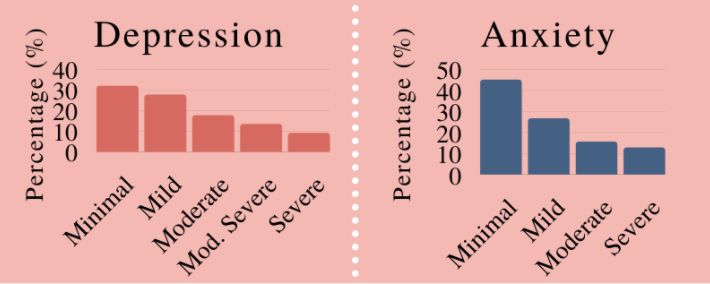Urgent Mental Health Needs Of Young Canadians: A Global Perspective

Table of Contents
Rising Rates of Mental Illness Among Young Canadians
The statistics are alarming. Mental health statistics Canada reveal a concerning trend of increasing rates of mental illness among young people. Studies show a substantial rise in youth depression and youth anxiety, with significant implications for their overall well-being and future prospects. The impact extends beyond personal struggles, affecting academic performance, social relationships, and even increasing suicide rates youth Canada.
- Percentage of young Canadians experiencing anxiety disorders: Estimates suggest that at least one in five young Canadians experiences an anxiety disorder, a figure that has been steadily increasing over the past decade. (Source needed – cite relevant Canadian mental health statistics organizations).
- Percentage experiencing depression: Similarly, a significant proportion of young Canadians are affected by depression, with rates mirroring and sometimes exceeding global averages. (Source needed – cite relevant Canadian mental health statistics organizations).
- Statistics on self-harm and suicide attempts: Self-harm and suicide attempts are tragically prevalent among young people struggling with mental health issues, highlighting the urgent need for intervention and support. (Source needed – cite relevant Canadian mental health statistics organizations).
- Comparison to global youth mental health statistics: While the specific figures vary across nations, the trend of rising youth mental health issues is a global phenomenon, underscoring the need for international collaboration and the sharing of best practices. (Source needed – cite relevant global mental health organizations).
Contributing Factors to the Mental Health Crisis
Several interconnected factors contribute to this escalating youth mental health crisis in Canada. Understanding these factors is crucial to developing effective prevention and intervention strategies.
- The impact of social media and cyberbullying: Constant connectivity and the pressure to project a perfect online persona contribute to anxiety, depression, and feelings of inadequacy. Cyberbullying adds another layer of emotional distress and social isolation.
- The pressure of academic achievement and future uncertainty: The intense competition for university admission and the looming uncertainty of the job market create significant stress and anxiety for young Canadians.
- The influence of peer pressure and social isolation: The pressure to conform to social norms and the fear of social isolation can have devastating effects on mental well-being.
- Economic insecurity and its effect on mental well-being: Financial stress within families can significantly impact the mental health of young people, adding to existing pressures and reducing access to resources.
- The role of family dynamics and trauma: Adverse childhood experiences (ACEs), such as family conflict, abuse, or neglect, significantly increase the risk of mental health problems later in life.
Inadequate Access to Mental Healthcare Services
Despite the urgent need, many young Canadians face significant barriers in accessing timely and appropriate mental healthcare services.
- Long waiting lists for therapy and counseling: Long wait times for mental health services are a common complaint, often delaying crucial intervention and exacerbating existing problems.
- Shortage of mental health professionals, particularly in rural areas: A lack of mental health professionals, particularly in rural and remote communities, creates significant geographical barriers to care.
- High cost of mental healthcare and lack of insurance coverage: The high cost of mental healthcare and inadequate insurance coverage often prevent young people from accessing the help they need.
- Stigma surrounding mental illness and seeking help: The pervasive stigma surrounding mental illness discourages many young people from seeking help, even when they are struggling.
- The potential of telehealth to improve access: Telehealth offers a promising avenue for improving access to mental healthcare, particularly in remote areas and for young people who may feel uncomfortable seeking in-person help.
Global Perspectives and Best Practices
Learning from other countries' experiences is crucial. Several nations have implemented successful mental health initiatives that could inspire similar programs in Canada.
- Examples of effective school-based mental health programs: Many countries have successfully integrated mental health services into schools, providing early intervention and support to students.
- Strategies for reducing stigma and promoting help-seeking behavior: Public awareness campaigns and educational programs can play a critical role in reducing stigma and encouraging help-seeking behavior among young people.
- Successful models of integrated mental health care: Integrating mental health services with primary care can improve access and early detection of mental health problems.
- Policies that prioritize mental health funding and accessibility: Increased government funding and policies that prioritize mental health accessibility are crucial for addressing the crisis.
Conclusion
The urgent mental health needs of young Canadians demand immediate attention. The rising rates of mental illness, coupled with inadequate access to care and persistent societal challenges, create a complex crisis requiring a multifaceted approach. By learning from global best practices, investing in accessible and affordable mental health services, and tackling the stigma surrounding mental illness, Canada can build a healthier future for its youth. We must advocate for increased funding, improved access to care, and reduced stigma. Let's work together to prioritize the urgent mental health needs of young Canadians and create a supportive environment where they can thrive. Visit [link to relevant resource 1] and [link to relevant resource 2] for more information and support. Addressing the urgent mental health needs of young Canadians is not just important; it's essential for building a stronger, healthier future for our nation.

Featured Posts
-
 Close Loss For Lady Raiders Cincinnati Wins 59 56 At Home
May 02, 2025
Close Loss For Lady Raiders Cincinnati Wins 59 56 At Home
May 02, 2025 -
 Christmas Voucher Glitch On Play Station Network Sonys Compensation Details
May 02, 2025
Christmas Voucher Glitch On Play Station Network Sonys Compensation Details
May 02, 2025 -
 Fierce Row Erupts Within Reform Uk Whats Happening
May 02, 2025
Fierce Row Erupts Within Reform Uk Whats Happening
May 02, 2025 -
 Priscilla Pointer 1923 2023 Celebrated Actress And Workshop Co Founder Passes Away
May 02, 2025
Priscilla Pointer 1923 2023 Celebrated Actress And Workshop Co Founder Passes Away
May 02, 2025 -
 Six Nations Rugby France Reigns Supreme Englands Victory Scotland And Ireland Struggle
May 02, 2025
Six Nations Rugby France Reigns Supreme Englands Victory Scotland And Ireland Struggle
May 02, 2025
Latest Posts
-
 Recent Developments Nigel Farage And Reform Uks Political Impact
May 03, 2025
Recent Developments Nigel Farage And Reform Uks Political Impact
May 03, 2025 -
 Five Threats To Reform Uks Political Future
May 03, 2025
Five Threats To Reform Uks Political Future
May 03, 2025 -
 Tory Chairman Condemns Farage Sparks Reform Uk Conflict
May 03, 2025
Tory Chairman Condemns Farage Sparks Reform Uk Conflict
May 03, 2025 -
 La Matinale De Mathieu Spinosi Le Violon En Direct
May 03, 2025
La Matinale De Mathieu Spinosi Le Violon En Direct
May 03, 2025 -
 Analyzing The Influence Of Reform Uk The Farage Factor
May 03, 2025
Analyzing The Influence Of Reform Uk The Farage Factor
May 03, 2025
